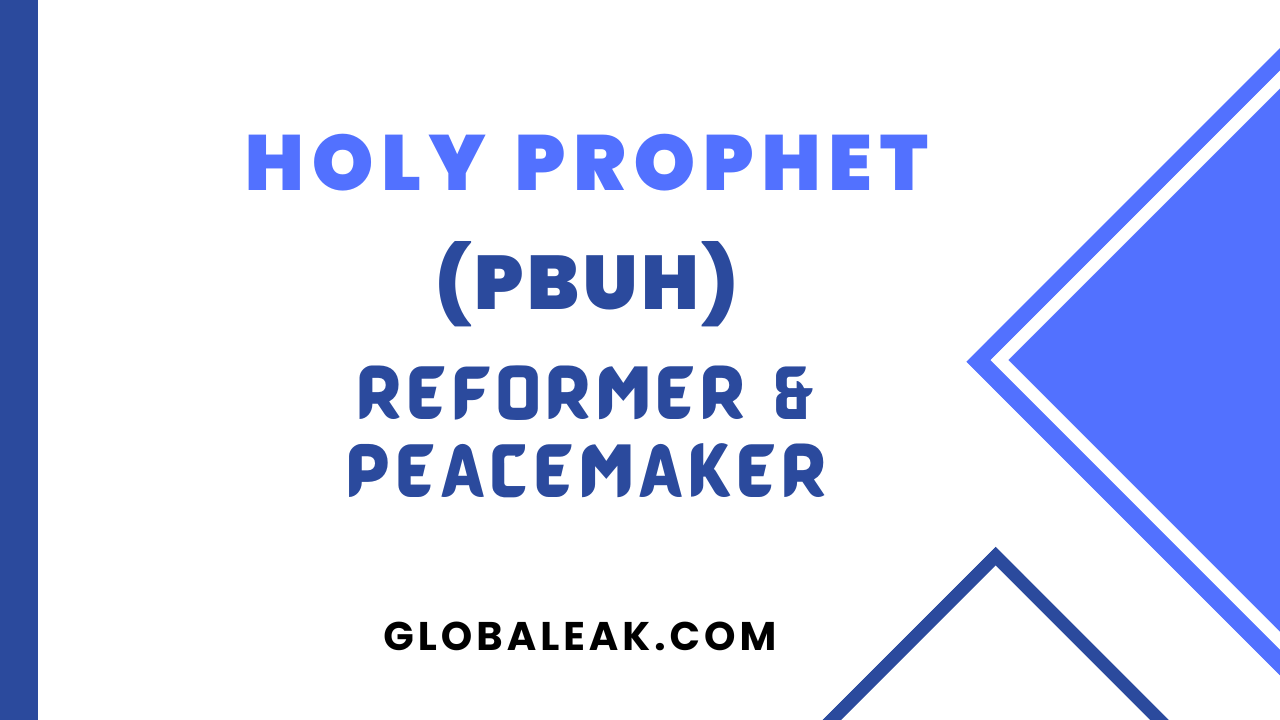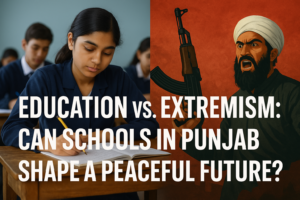Introduction
The Prophet (PBUH) once said:
“It is better for the ‘imam to err on the side of compassion than on the side of punishment” (Sunan Altirmidhi, Kitab al hudud, Vol 4, p 25).
Extraordinary traits like simplicity, sincerity, truthfulness and honesty of Prophet Muhammad (peace be upon him) serve as guidelines for all of us. The majestic (PBUH) established the world’s first welfare state, and saved the oppressed people. His motto was justice and equality, who advocated simplicity and sincerity.
Social equality
Of all the reforms initiated by the Prophet the removal of social inequality was most important and far-reaching in consequences. He could not find any reason for any distinction between man and man on the basis of gender.
Negation of gendered notions
Before the advent of Islam, women were looked down upon and treated as chattels in society. It was Muhammad (peace be upon him) who did all that was possible to raise the status of women.
In Islam there is absolutely no difference between men and women as far as their relationship to Allah is concerned. Both are promised the same reward for good conduct and the same punishment for evil conduct.
The Qur’an says:
“And for women are rights over men similar to those of men over women.” (2:226)
Also, the Qur’an, in addressing the believers, often uses the expression,’believing men and women to emphasize the equality of men and women.
The Prophet Muhammad (Peace Be Upon Him) was full of praise for virtuous women. He said: “The world and all things in the world are precious but the most precious thing in the world is a virtuous woman. He once told to Hazrat Umar(R.A.):
“Shall I not inform you about the best treasure a man can hoard? It is a virtuous wife who pleases him whenever he looks towards her, and who guards herself when he is absent from her.”
Just treatment with the masses
Previously in the society it was a common practice to deal with a favour to rich. Narrated by Aisha(R.A) A woman of the Makhzoom family with good connections was found guilty of theft. For the prestige of the Quraysh, some prominent people including Usaamah Ibn Zayd interceded to save her from punishment. The Prophet refused to condone the crime and expressed displeasure saying: “Many a community ruined itself in the past as they only punished the indigent and ignored the offences of the exalted. By God Almighty, if Muhammad’s daughter Fatimah would have committed theft, her hand would have been severed.”
(Sahih al-Bukhari)
The prophet ﷺ, throughout his life, stood up for justice and opposed all forms of oppression. The Prophet (peace be upon him) disliked to receive differential treatment from his Companions, and wanted to bear the same difficulties and hardships as them.
Abdullah ibn Masoud narrated: uring the battle of Badr, three of us would have one camel to ride. Abu Lubabah and Ali ibn Abu Talib were with the Messenger of Allah (peace be upon him), and it was the Messenger of Allah’s turn to walk. Consequently, the other two said, ‘We will walk instead of you and let you ride.’ The Prophet (peace be upon him) replied, ‘You two are not stronger than me, and I am not in less need of rewards than you.’
Religious freedom
“There is no compulsion in religion” (2:256).
Prophet (PBUH) permitted Najrani Christian priests to offer their prayers in his mosque and to have an open religious dialogue before an audience.
Moreover, he later wrote them a decree that declared “No compulsion is to be on them; No one is to destroy a house of their religion, to damage it, or to carry anything from it to the Muslims’ houses; they are my allies and have my secure charter against all that they hate.”
Racial Equality
Pre-Islamic Arab society had racial biases against non-Arabs. The Prophet (PBUH) managed to purify these primitive sentiments by his personal example.
His closest companions Bilal bin Riba (an Abyssinian) and Salman Farsi (a Persian) were both former slaves who went on to command enormous respect in the first Muslim society.
In his famous last sermon, the Prophet declared:
“A white has no superiority over black, nor does a black over a white, except by piety and good action”.
Educational reforms
All great civilizations, such as the Greeks, Romans, Persians and today in the form of West, have arisen mainly by advancing human rights and the rule of law. The rise of the Islamic civilization between the 7th and 13th centuries also owes itself to this principle. Few individuals in any civilization have been able to accomplish religious, gender, educational, racial and conflict-resolution reforms all at once. Prophet Muhammad, the founder of Islam, reformed his society in all five respects which laid the foundation of the Arab and Muslim civilization.
Their later decline and today’s extremism from some Muslims has unfortunately obscured the historical contributions by the Prophet for humanity.
The Prophet famously declared that
“learning is obligatory upon every Muslim man and woman” and that “he who gives the best upbringing and education to his daughters shall enter paradise.”
In his unlettered society, he encouraged his followers learn writing so to be able to transmit Quran’s message far and wide.
Clearly, it was that encouragement which ultimately led to the Islamic golden age of science which advanced medicine, astronomy, algebra and philosophy and also contributed to the Western Renaissance.
Religious Freedom
Some intolerant Muslims today persecute non-Muslims for proselytizing or blasphemy. In contrast, the Islamic Holy scripture Quran states that “there is no compulsion in religion” (2:256). However, few know of its context. Before the migration of Prophet Muhammad to Madina, some polytheists in the town had dedicated their children to be raised in the monotheistic Jewish tradition.
After converting to Islam, the parents objected to this when the Jewish guardians took the children with them. However, the Prophet refused them permission to forcibly take back their children or to convert them to Islam in the light of this Quranic verse.
Moreover, the Prophet permitted Najrani Christian priests to offer their prayers in his mosque and to have an open religious dialogue before an audience.
Plus, he later wrote them a decree that declared “No compulsion is to be on them; No one is to destroy a house of their religion, to damage it, or to carry anything from it to the Muslims’ houses; they are my allies and have my secure charter against all that they hate.
Women’s Rights
In the pre-Islamic society, some proud pagans practiced ‘honor’ killings and female infanticide to offset their ‘shame.’ The numerous reforms which the Prophet instituted in the 7th century included the end of ‘honor’ killings, the right of a woman’s approval in her marriage, her right to ownership of private property, to seek unilateral divorce if the husband was abusive and to re-marry as a widow or divorcee.
Some of these rights did not exist even in the West until the early 20th century. Moreover, as the Prophet taught, while a husband was supposed to provide for his wife, the wife was under no obligation to share her wealth or property with the husband.
It was narrated by Ibn Abbas that the Messenger of Allah(ﷺ) said:
“There is no man whose two daughters reach the age of puberty and he treats them kindly for the time they are together, but they will gain him admittance to Paradise.” (Sunan Ibn Majah Vol.5: 3670)
Reforms in the event of wars
Quran permitted war only for establishing religious freedom or for self-defense.
The Prophet was himself driven out of his city for preaching his religion, his followers were persecuted or killed and their bodies were mutilated. Yet, he himself forbade retaliation in kind or the holding of slaves except as prisoners captured in such conflicts.
His instructions for humane treatment of prisoners during a conflict were exemplary: no women, children, hermits or other non-combatants were to be harmed and that prisoners or slaves were to be fed the same food and clothed the same clothes as the Muslims themselves.
Reforms in financial matters
Prophet Muhammad (peace be upon him and his family) implemented a comprehensive system comprising not only of Zakat as per order of Allah Almighty (The Most Exalted) but also Khairat and Sadaqaat clearly favoring equal distribution of capital.
Objective of the zakat is to provide basic necessities to poor. The Prophet Muhammad (May Allah honor Him and grant Him peace) said:
“Verily Allah has ordained the payment of Zakat on them (Muslims). It will be taken from the rich and returned to the poor.” (Sahih Muslim Vol 1:21)
These Traditions make it quite obvious that there is also a social and economic aspect of the poor-due without which its Islamic concept remains incomplete.
Protection of slaves
A person came to the Prophet (ﷺ) and asked:
“Messenger of Allah! how often shall I forgive a servant? He gave no reply, so the man repeated what he had said, but he still kept silence. When he asked a third time, he replied: Forgive him seventy times daily.” (Sunan Abi Dawud 5164)
Prophet Muhammad peace be upon him ordered the Muslims to be very sensitive to their slaves. He ordered the Muslims to buy the slave young boys and girls the same quality of clothes and gifts that they would buy for their children. He also ordered Muslims not to hit or be violent to adult slaves. He ordained to be loving and caring for them.
Prophet Muhammad (S.A.W) also urged wealthy Muslims to buy slaves from the Pagan Arabs and to let them free after that.
Conclusion
Prof K S Ramakrishna Rao – Professor of Philosophy at the University of Mysore, India expressed the greatness of Prophet Muhammad (PBUH) in these words:
“There is Mohammad the Prophet, there is Mohammad the General; Mohammad the King; Mohammad the Warrior; Mohammad the Businessman; Mohammad the Preacher; Mohammad the Philosopher; Mohammad the Statesman; Mohammad the Orator; Mohammad the reformer; Mohammad the Refuge of orphans; Mohammad the Protector of slaves; Mohammad the Emancipator of women; Mohammad the Law-giver; Mohammad the Judge; Mohammad the Saint. And in all these magnificent roles, in all these departments of human activities, he is like, a hero.”
Alfred Martin – American Philosopher said that if we judge greatness by influence, he (PBUH) was one of the giants of history. He undertook to raise the spiritual and moral level of a people.
You can also read: Six Major World Religions, Origins & Beliefs
📍 English Language Educator | Blogger & Content Strategist | 7+ Years in Educational Blogging
Nosheen Bashir is a dedicated English teacher and experienced blogger with over seven years of expertise in content creation and educational writing. Passionate about language, literature, and effective communication, she combines her teaching experience with blogging skills to create insightful, research-backed content that helps learners and educators alike.
🔹 Expertise & Achievements:
✔ English Language Education: A skilled educator with years of experience in teaching English grammar, literature, and communication skills to students of varying levels.
✔ Educational Blogging: Running a successful blog for 7+ years, delivering well-structured, engaging content on language learning, writing techniques, and academic success.
✔ SEO & Content Strategy: Specializes in creating high-ranking, authoritative articles that follow Google’s EEAT principles, ensuring content that is both informative and search-friendly.
✔ Student-Centric Approach: Committed to making English easier, engaging, and accessible, helping readers and students improve their language proficiency.
🚀 With a passion for teaching and writing, Nosheen Bashir is dedicated to crafting educational content that empowers students, teachers, and language enthusiasts worldwide.




